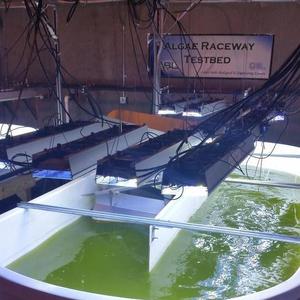Algae raceway paves path from lab to real-world applications

Photo: Dino Vournas, Sandia National Laboratories
February 9, 2016
BY DOE/Sandia National Laboratories
In a twist of geometry, an oval can make a line. The new algae raceway testing facility at Sandia National Laboratories may be oval in shape, but it paves a direct path between laboratory research and solving the demand for clean energy.
As the nation and California adopt policies to promote clean transportation fuels, that path could help bring the promise of algal biofuels closer to reality. As one of the fastest growing organisms on the planet, algae are an ideal source of biomass, but researchers have not yet found a cost-competitive way to use algae for fuels.
“This facility helps bridge the gap from the lab to the real world by giving us an environmentally controlled raceway that we can monitor to test and fine tune discoveries,” said Ben Wu, Sandia’s biomass science and conversion technology manager.
“The success of moving technologies from a research lab to large outdoor facilities is tenuous. The scale-up from flask to a 150,000-liter outdoor raceway pond is just too big.”
Advertisement
The new Sandia algae testing facility consists of three 1,000-liter raceway ponds with advanced monitoring provides new advantages to researchers:
- Easy scale-up to larger, outdoor raceways
- Customizable lighting and temperature controls, operational by year end, to simulate the conditions of locations across the country
- Fully contained for testing genetic strains and crop protection strategies
- Advanced hyperspectral monitoring 24 hours a day
Advertisement
Several ongoing projects will use the algae raceway right away. Researchers Todd Lane and Anne Ruffing will test genetically modified algae strains as part of a project funded by Sandia’s laboratory directed research and development program. The algae raceway will allow the researchers to more quickly identify strains that promise improved performance.
Lane is also part of a project partnership with Lawrence Livermore National Laboratory funded by the U.S. DOE’s Bioenergy Technologies Office that is investigating a probiotic approach to algae crop protection.
Another BETO project seeks to convert algae proteins into useful chemical compounds such as butanol. Wu expects the facility will expand opportunities for Sandia researchers to develop algae as a robust source of biofuels and increase collaborations and partnerships with the private sector, particularly in California where efforts to transform transportation energy are prevalent.
“The bioeconomy is gaining momentum,” he said. “Biofuels from algae may be further off, but algae has sugar and proteins that can make fuel or higher valued products, such as butanol or nylon—products that currently come from fossil fuels.”
Sandia National Laboratories is a multiprogram laboratory operated by Sandia Corp., a wholly owned subsidiary of Lockheed Martin Corp., for the DOE’s National Nuclear Security Administration. With main facilities in Albuquerque, New Mexico, and Livermore, California, Sandia has major R&D responsibilities in national security, energy and environmental technologies and economic competitiveness.
Related Stories
China’s exports of used cooking oil (UCO) reached a record high in 2024 but fell sharply in December after the Chinese government eliminated the 13% export tax rebate for UCO, according to a report filed with the USDA.
Ash Creek Renewables expands global reach with exclusive camelina seed licenses and 'Forks and Fuels' initiative
Ash Creek Renewables, a portfolio company of Tailwater Capital LLC, on March 20 announced it has secured exclusive licensing rights from Montana State University for a new high-performance camelina seed variety.
Clean Fuels Alliance America on March 18 submitted comments supporting USDA on its Technical Guidelines for Climate-Smart Agriculture Crops Used as Biofuel Feedstocks Interim Rule and incorporation of USDA FD-CIC.
Japan-based Cosmo Oil Co. Ltd. on March 6 announced that construction is complete on a SAF located within the company’s existing Sakai refinery. The facility, operated by Saffaire Sky Energy LLC, is expected to begin supplying SAF in April.
Preliminary agenda announced for 2025 International Fuel Ethanol Workshop & Expo
Ethanol Producer Magazine announced this week the preliminary agenda for the 2025 International Fuel Ethanol Workshop & Expo (FEW) taking place June 9-11, 2025 at the CHI Health Center in Omaha, Nebraska.
Upcoming Events










